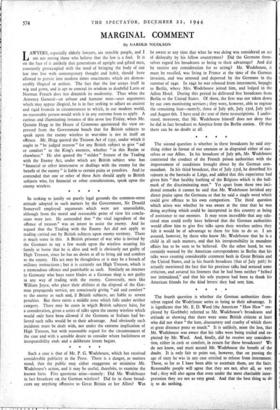The second question is whether in these broadcasts he said
any- thing either in favour of our enemies or in dispraisal either of our- selves or our Allies. In his broadcast of July 9th, Mr. Wodehouse contrasted the conduct of the French prison authorities with the improvement of conditions brought about by the German com- mandant. In his third broadcast, that of July 23rd, he described his sojourn in the barracks at Liege, and added that this experience had given him " that healthy loathing of the Belgians which is the hall- mark of the discriminating man." Yet apart from these two inci- dental remarks it cannot be said that Mr. Wodehouse lavished any direct praise upon the Germans or that he said a single word which could give offence to his own compatriots. The third question which arises was whether he was aware at the time that he was doing anything which could be imerpreted in this country as being of assistance to our enemies. It may seem incredible that any edu- cated man could really have believed that the German authorities would allow him to give five talks upon their wireless unless they felt it would be of advantage to them for him to do so. I am assured, however, by those who know Mr. Wodehouse that he is a child in all such matters, and that his irresponsibility in mundane affairs has to be seen to be believed. On the other hand, he was certainly warned by the American correspondents in Berlin that his talks were creating considerable comment both in Great Britain and the United States, and in his fourth broadcast (that of July 30th) he actually mentioned the fact that his previous talks had aroused some criticism, and assured his listeners that he had been neither " bribed nor intimidated," and that his sole purpose had been to thank his American friends for the kind letters' they had sent him.


























 Previous page
Previous page